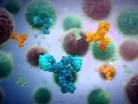Rheumatoid arthritis patients given new treatment hope

New data has revealed that tens of thousands of rheumatoid arthritis (RA) sufferers who cannot take the current mainstay of treatment, methotrexate (MTX), are almost four times as likely to achieve disease remission from RoActemra (tocilizumab) compared to patients taking the most widely prescribed anti TNF, Humira (adalimumab).
Patients treated with RoActemra also achieved a significantly greater reduction in their disease signs and symptoms after six months, which includes painful joint swelling and difficulty in completing everyday tasks.
This is the first study of its kind to demonstrate superiority between two approved biological drugs in RA patients with an intolerance or inadequate response to MTX.
To read the latest edition of Healthcare Global, click here
- UNICEF tackles pneumonia and diarrhea to save 2m lives
- GP surgeries to be scored out of 10 by patients
- New hope for a universal pneumococcal meningitis vaccine
MTX is the current standard of care for patients with RA in the UK and has been used in treatment since the late 1980’s.
However, of the estimated 46,000 RA patients on a biologic treatment in the UK, approximately one in three are not taking MTX, as they are intolerant to the drug or where treatment with MTX for other reasons is inappropriate.
For those RA patients who cannot tolerate MTX, side effects can include nausea and vomiting, diarrhoea, mouth ulcers, hair loss and skin rashes – perhaps explaining why 30 percent of all biologics patients are on biological monotherapy.
The results, presented today at the annual European Congress of Rheumatology, of the pioneering global head-to-head ADACTA (ADalimumab ACTemrA) study among 326 patients, including five trial centres in the UK, confirm tocilizumab’s superior efficacy over adalimumab offering an alternative treatment option for the thousands of RA patients unable to take MTX.
In a separate study, tocilizumab is the first and only biologic to have published data to demonstrate its superiority as a biologic monotherapy treatment over MTX in standard RA clinical efficacy parameters at 24 weeks.
Tocilizumab works differently from other RA treatments by targeting IL-6 receptors which are found throughout the body.
In RA, excess IL-6 is linked to inflammation of the joints, joint destruction, and many systemic manifestations such as fatigue and anaemia.
Inhibiting IL-6 has an effect on systemic and local RA symptoms, providing a holistic approach to treating the condition.
Tocilizumab therapy has an established safety profile as demonstrated over 69,330 patient years.
The most common adverse reactions reported in clinical studies were upper respiratory tract infection, nasopharyngitis, headache, elevated blood pressure, and increased liver enzymes.
The serious adverse reactions reported in clinical studies include serious infections, gastrointestinal perforations and hypersensitivity reactions including anaphylaxis.
The Healthcare Global magazine is now available on the iPad. Click here to download it.
- Efficient communications can reduce hospital emergenciesHospitals
- Most US outpatients not engaged with healthcare, study findsHospitals
- Startup signs with Gilead to help more people with arthritisDigital Healthcare
- Are high costs causing an unhealthy relationship with patients?Medical Devices & Pharma



